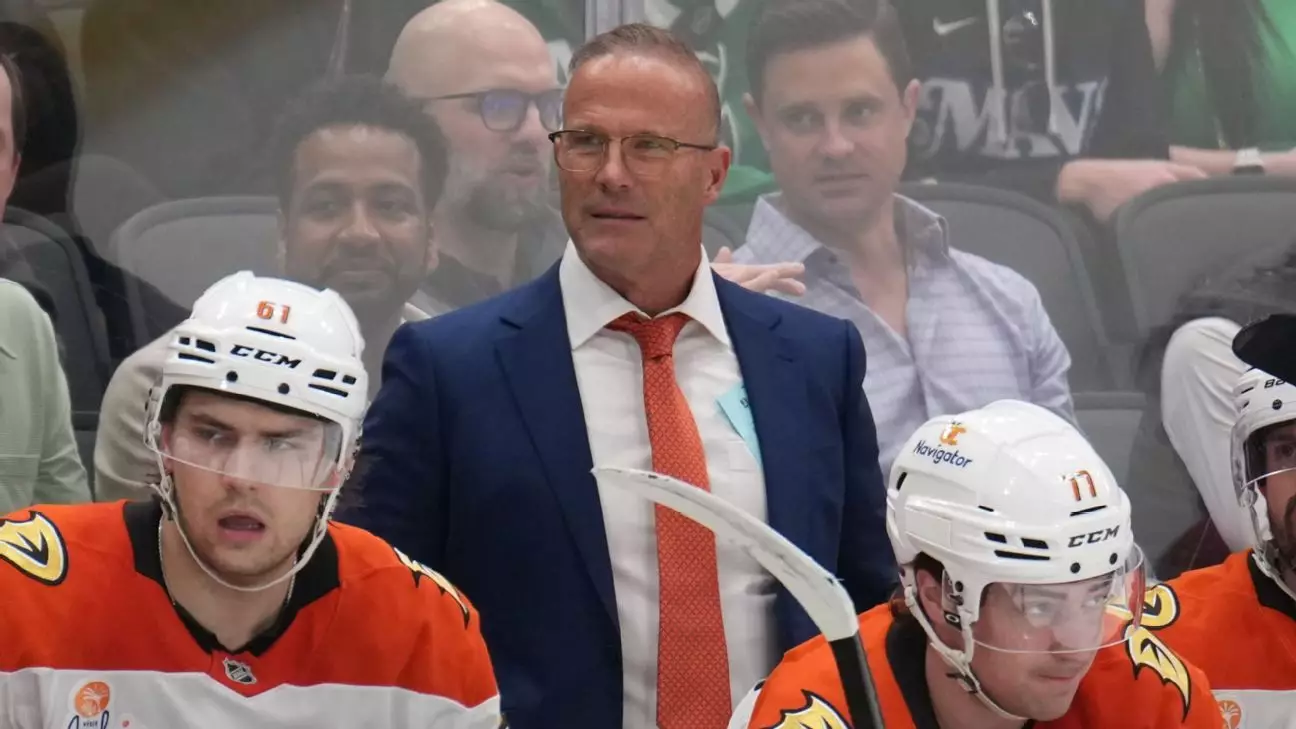The Anaheim Ducks recently announced the departure of head coach Greg Cronin, a decision emerged from a combination of team reflection and the pressing need for change. Cronin, who was signed through the 2025-26 season, has been relieved of his duties after two tumultuous years that saw the team struggle for consistency on the ice. Despite showing signs of improvement with a 35-37-10 record this past season, the Ducks still fell short of their ultimate goal—the playoffs—for the seventh consecutive year.
General Manager Pat Verbeek faced the difficult task of informing Cronin of his termination during an early morning meeting—a moment described as shocking for the coach. The decision, while undoubtedly painful, reflects the pressing dynamics within professional sports that often prioritize immediate results and long-term vision over loyalty and continuity. Evaluating Cronin’s performance, Verbeek noted that although there were promising advancements within the team’s young core, the lingering question remained: could the Ducks evolve into a playoff contender under Cronin’s guidance?
Assessing the Performance: Promise Amidst Challenges
Cronin’s tenure was characterized by a rebuilding phase, marked by notable highs and lows. The previous season saw the Ducks struggle significantly, ending with a disappointing 27-50-5 record. In contrast, the latest season exhibited a marginal improvement, but with a points percentage of .488, it was far from satisfactory for a franchise with aspirations of returning to championship contention. The Ducks’ inability to make the playoffs amplified the urgency for Verbeek to reassess the leadership.
While Cronin deserves recognition for fostering the development of young talents—emerging stars such as Leo Carlsson, Mason McTavish, and rookie Cutter Gauthier—the offensive struggles were difficult to overlook. Finishing 30th in offensive rankings under his coaching raises a crucial question: was Cronin able to maximize the potential of his players? Fans were also quick to voice concerns regarding his deployment of young athletes, often questioning the amount of ice time given to promising newcomers compared to established veterans.
Defensive Struggles and Goalie Dilemmas
For a team looking to build a competitive image, the issues extended beyond the offensive realm. The Ducks ranked 23rd in team defense, partially influenced by the inconsistent performances of goalies Lukas Dostal and John Gibson. With a team save percentage of .901—ninth best in the NHL—one might argue that the defensive woes were not solely the responsibility of the coaching staff. Yet, the necessity for a cohesive system that adequately supports both offensive and defensive players cannot be understated; and in this respect, Cronin’s methods ultimately fell short.
Furthermore, the Ducks’ necessity for a robust identity on ice was palpable. With young, talented athletes poised to take charge, Verbeek recognized the requirement for a fresh voice—a figure capable of galvanizing the roster towards the goal of playoff contention. His belief that “a voice is needed to push this group to another level” denotes a crucial understanding of the intrinsic values that fuel team dynamics.
Looking Ahead: The Future of the Ducks
As the Ducks enter this transitional phase, the question of who will take over for Cronin becomes critical. The organization is at a crossroads; with expectations raised by Verbeek’s declaration that the Ducks should make the playoffs next season, the next coach will carry the weight of revitalizing a storied franchise. Intriguingly, this urgency highlights a pivotal shift in mindset that the Ducks have embraced—no longer are they content with mediocrity.
Verbeek’s pursuit of excellence encapsulates a newfound ambition within the Ducks’ organization, wherein every decision is fueled by the intent to forge a competitive future. While the departure of Cronin is undoubtedly a poignant chapter in the team’s narrative, it lays the groundwork for what many hope will be a resurgence in Anaheim—a refinement of talent that could harness its young core’s potential and revive a once-celebrated franchise.
The objective of the Ducks is clear; they must not only find a coach who can effectively manage a blend of youth and experience but also instill a winning culture that resonates throughout the organization. As they embark on this search, one can’t help but anticipate the evolution that lies ahead for this team en route to reclaiming its place among the NHL elite.


Leave a Reply